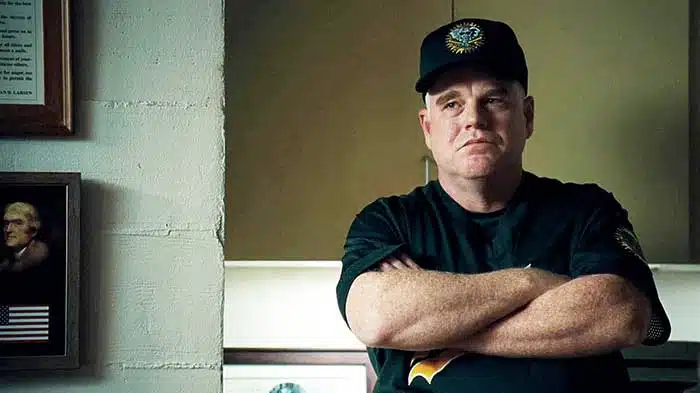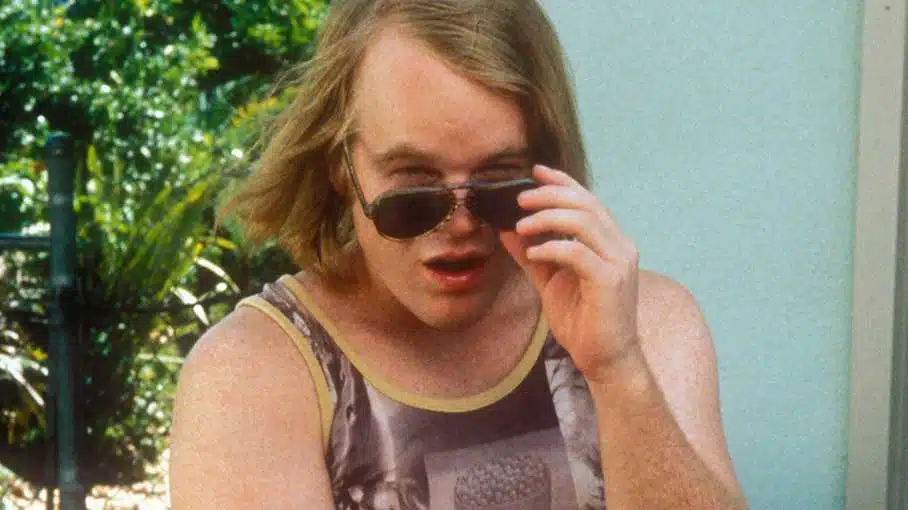Philip Seymour Hoffman | Polydrug Overdose Death
- About Philip Seymour Hoffman
- How Phillip Seymour Hoffman Died
- History Of Substance Abuse & Rehab
- Recovery Is Possible

On February 2, 2014, actor Philip Seymour Hoffman died of a drug overdose at the age of 46. Toxicology reports confirmed that a combination of heroin, cocaine, benzodiazepines, and amphetamines caused his death.
Up until Hoffman’s death, the actor had a storied career in both Hollywood and Broadway.
He played roles in movies such as Boogie Nights, Moneyball, Along Came Polly, Magnolia, and The Big Lebowski. His theater career included a starring role as Willy Loman in Death of a Salesman.

Hoffman battled with drug use, sobriety, and mental health problems for decades. He first became sober in his 20s. However, the struggles of addiction continued to affect his mental health up until his death.
About Philip Seymour Hoffman
Hoffman was born in Fairport, New York in 1967. He gained an interest in theater in high school, studied drama while attending college in Manhattan, New York City, and graduated with a bachelor’s degree in 1989.
From there, Hoffman landed secondary roles in movies such as Dead Poets Society, Scent of a Woman, and Twister. Hoffman’s breakout performance came in Paul Thomas Anderson’s Boogie Nights.

Praise & Acclaim
Throughout his career, Hoffman earned praise for his emotional versatility and unique acting style, which he demonstrated in movies such as The Talented Mr. Ripley, Almost Famous, Catching Fire, Mission: Impossible III, and Before the Devil Knows You’re Dead.
Due to his captivating performance as Truman Capote in the 2005 movie Capote, Hoffman became an Oscar-winning actor. He also earned several Academy Award nominations for Best Supporting Actor roles in the movies Doubt, The Master, and Charlie Wilson’s War.
How Phillip Seymour Hoffman Died
Shortly before Philip Seymour Hoffman’s death, he relapsed into drug and alcohol abuse. His partner and costume designer, Mimi O’Donnell, confirmed the actor abused heroin, prescription opioids, and alcohol in 2013. This relapse occurred after over 20 years of sobriety.
On February 2, 2014, Hoffman was found dead in a Greenwich village, New York apartment. Filming for his movie The Hunger Games: Mockingjay was still ongoing. Multiple doses of heroin were found in the apartment.

Hoffman’s official cause of death was ruled an acute mixed drug intoxication. Multiple substances, including heroin, cocaine, benzodiazepines, and amphetamines, led to his death.
Phillip Seymour Hoffman’s History Of Substance Abuse & Rehab
Hoffman’s battle with addiction began in his 20s, where he developed an addiction to heroin and alcohol. According to O’Donnell, Hoffman entered his first rehab program at 22.
Hoffman also became sober in his 20s, and frequently attended Alcoholics Anonymous meetings. His sobriety lasted for over 20 years, although O’Donnell believed it always affected him.
Hoffman entered drug and alcohol rehab programs multiple times throughout his career, including the year before his death.
In an interview, O’Donnell described Hoffman’s addiction as “lurking just below the surface,” even during long periods of sobriety.
Recovery Is Possible
Drug addiction is a lifelong process that requires constant upkeep to stay sober. To maintain recovery, we must lean on one another for support and continue to work hard every day.
Recovery is possible, especially with ongoing care and compassionate professional assistance. For information on our addiction treatment options, please contact us today.
Written by Ark Behavioral Health Editorial Team
©2024 Ark National Holdings, LLC. | All Rights Reserved.
This page does not provide medical advice.

Questions About Treatment?
Ark Behavioral Health offers 100% confidential substance abuse assessment and treatment placement tailored to your individual needs. Achieve long-term recovery.
100% confidential. We respect your privacy.
Prefer Texting?
Our friendly support team is here to chat 24/7. Opt out any time.







 Learn More
Learn More








